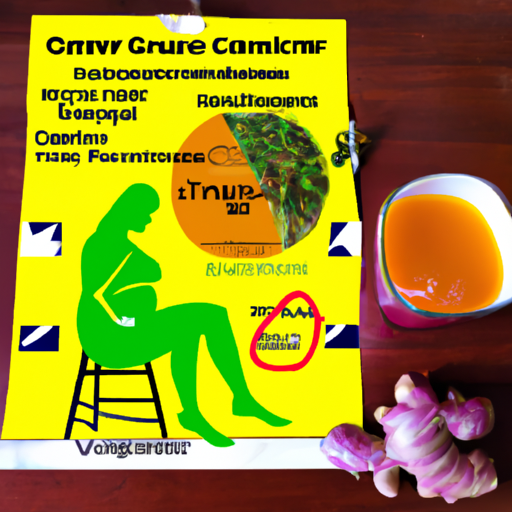Is it safe to drink fennel tea daily, just like the saying, ‘An apple a day keeps the doctor away’?
This question has been on my mind lately, and I’ve done some research to find the answer. Fennel tea has gained popularity in recent years due to its potential health benefits. It is known for its soothing properties and digestive benefits.
But before we dive into the safety of drinking fennel tea daily, let’s first understand its composition. Fennel tea is made from the seeds of the fennel plant, which contain essential oils, antioxidants, and other beneficial compounds. These components contribute to its potential health benefits.
However, like any herbal tea, moderation is key. It is essential to consider the daily recommended intake and potential side effects of fennel tea. Additionally, specific personal factors, such as pregnancy, breastfeeding, and age, should be taken into account.
In this article, we will explore the safety of drinking fennel tea every day and provide evidence-based information to help you make an informed decision.
Key Takeaways
- Fennel tea contains essential oils, antioxidants, and beneficial compounds that can aid in digestion and relieve bloating, gas, and stomach cramps.
- Excessive consumption of fennel tea can lead to liver damage and hormonal imbalance, so it should be consumed in moderation.
- Fennel tea may interact with medications and supplements, potentially reducing their effectiveness, so it’s important to consult with a healthcare professional before regular consumption, especially if taking prescription medications.
- While fennel tea can have various health benefits, personal factors such as age, overall health, and existing medical conditions should be considered, and moderation is key to avoid unwanted side effects.
Potential Health Benefits of Fennel Tea
If you choose to consume fennel tea on a daily basis, you’ll experience a potential array of health benefits. Fennel tea has been used for centuries in culinary traditions and is known for its potential digestive properties.
Fennel tea can be made by steeping crushed fennel seeds in hot water, and it has a pleasant, aromatic taste that’s reminiscent of licorice.
One of the potential culinary uses of fennel tea is its ability to aid in digestion. Fennel seeds contain compounds that can help relax the muscles in the digestive tract, which may help relieve bloating, gas, and stomach cramps. Additionally, fennel tea has been used as a natural remedy for indigestion and heartburn. It can also act as a mild diuretic, helping to reduce water retention and promote healthy urine flow.
Understanding the composition of fennel tea is important for fully appreciating its potential health benefits. Fennel seeds contain essential oils, including anethole, which is responsible for its distinctive flavor and aroma. These essential oils also have antioxidant and anti-inflammatory properties, which may contribute to the potential health benefits of fennel tea.
Transitioning into the subsequent section about understanding the composition of fennel tea, it’s crucial to explore its potential effects on overall health and well-being.
Understanding the Composition of Fennel Tea
With its delicate blend of flavors and aromatic essence, sipping on fennel tea transports you to a serene herbal oasis. To fully understand the benefits and potential risks of drinking fennel tea daily, it’s important to delve into its composition.
Fennel tea is made from the seeds of the fennel plant (Foeniculum vulgare) and is rich in essential oils, vitamins, and minerals. An analysis of its composition reveals that fennel tea contains compounds such as anethole, fenchone, and estragole, which contribute to its unique taste and therapeutic properties.
Fennel tea is produced using various methods, including the infusion and decoction techniques. In the infusion method, hot water is poured over crushed fennel seeds and allowed to steep for a few minutes. This process helps extract the essential oils and other beneficial compounds from the seeds. On the other hand, the decoction method involves boiling the seeds in water for a longer period of time, which allows for a stronger flavor and enhanced extraction of nutrients.
Understanding the composition and production methods of fennel tea is crucial in assessing its safety for daily consumption. Transitioning to the subsequent section about the daily recommended intake of fennel tea, it’s important to consider the potential health benefits and any possible risks associated with excessive consumption.
Daily Recommended Intake of Fennel Tea
In understanding the daily recommended intake of fennel tea, it’s important to consider safe dosage guidelines and potential risks of excessive consumption.
As an individual who enjoys drinking fennel tea regularly, I’ve researched this topic extensively and I’ve found that the general recommendation is to consume no more than two to three cups per day. This is because excessive consumption of fennel tea can potentially lead to adverse effects such as liver damage and hormonal imbalance.
Safe Dosage Guidelines
Drinking fennel tea daily can provide a sense of comfort and reassurance, knowing that you’re safely adhering to the recommended dosage guidelines. Fennel tea is generally considered safe when consumed in moderation.
The safe consumption levels of fennel tea vary depending on factors such as age, overall health, and any existing medical conditions. It’s important to consult with a healthcare professional to determine the appropriate dosage for you.
While fennel tea is generally well-tolerated, potential side effects may include allergic reactions, gastrointestinal discomfort, and hormonal changes. It’s crucial to monitor your body’s response and adjust the dosage accordingly.
Transitioning into the next section about potential risks of excessive consumption, it’s important to maintain a balanced approach to ensure the continued safety and enjoyment of fennel tea.
Potential Risks of Excessive Consumption
Be cautious not to overindulge in fennel tea, as excessive consumption can lead to potential risks and may cause adverse effects on your health. While fennel tea is generally safe when consumed in moderation, consuming large amounts of it may have negative consequences. It’s important to be aware of the potential risks associated with excessive fennel tea consumption.
-
Potential benefits of fennel tea for digestion:
- Fennel tea has traditionally been used to aid digestion and relieve bloating.
- It may help soothe an upset stomach and promote healthy digestion.
-
Potential interactions with medications and supplements:
- Fennel tea may interact with certain medications and supplements, potentially reducing their effectiveness.
- It’s advisable to consult with your healthcare provider before consuming fennel tea if you’re taking any medications or supplements.
Excessive consumption of fennel tea can have potential risks and may interact with certain medications and supplements. In the next section, we’ll explore the potential side effects of fennel tea.
Potential Side Effects of Fennel Tea
However, you may want to consider the potential side effects of drinking fennel tea every day. While fennel tea is generally safe for most people, it can still cause some adverse reactions in certain individuals.
One potential side effect is the occurrence of allergic reactions. Some people may be allergic to fennel or other plants in the same family, such as celery or carrots. Symptoms of an allergic reaction may include itching, swelling, and difficulty breathing. If you experience any of these symptoms after consuming fennel tea, it’s important to seek medical attention immediately.
Another consideration is the potential impact on medication efficacy. Fennel tea contains compounds that can interact with certain medications, particularly those metabolized by the liver. These interactions can either increase or decrease the effectiveness of the medication, leading to potential health risks. It’s crucial to consult with a healthcare professional before consuming fennel tea regularly, especially if you take prescription medications.
While fennel tea can offer numerous health benefits, it’s essential to be aware of the potential side effects. Allergic reactions and interactions with medications are important factors to consider. If you experience any adverse effects, it’s important to discontinue use and consult with a healthcare provider.
Now, let’s move on to the next section about the safety of fennel tea during pregnancy.
Fennel Tea and Pregnancy
If you’re expecting a baby, it’s important to know the potential impact of consuming fennel tea during pregnancy. Fennel tea is commonly used for its potential health benefits, but its effects on pregnancy are not well-studied.
Here are some important considerations to keep in mind:
-
Fennel tea and fertility: Some studies suggest that fennel tea may have estrogen-like effects, which could potentially interfere with fertility. If you’re trying to conceive, it may be best to avoid fennel tea or consult with your healthcare provider.
-
Fennel tea and menstrual cramps: Fennel tea has been traditionally used to alleviate menstrual cramps due to its potential antispasmodic properties. However, there is limited scientific evidence to support this claim. If you experience severe menstrual cramps during pregnancy, it’s important to consult with your healthcare provider for appropriate management options.
-
Fennel tea and pregnancy: Due to the limited research available, it’s generally recommended to err on the side of caution and avoid consuming fennel tea during pregnancy. This is especially important during the first trimester when the baby’s organs are developing.
Transition: Now that we’ve discussed the potential impact of fennel tea during pregnancy, let’s explore its effects on breastfeeding.
Fennel Tea and Breastfeeding
When you’re breastfeeding, it’s important to consider the potential effects of consuming fennel tea. Fennel tea has been used for centuries to promote breast milk production and aid in infant digestion. It contains compounds that can stimulate the mammary glands and increase milk flow, which can be beneficial for nursing mothers who may be struggling with low milk supply.
Additionally, fennel tea has been shown to have a soothing effect on the gastrointestinal tract, helping to relieve colic and other digestive issues in infants.
However, it’s important to note that while fennel tea can have positive effects on breast milk production and infant digestion, it should still be consumed in moderation. Like any herbal tea, excessive consumption of fennel tea can have negative effects. It is always best to consult with a healthcare provider before incorporating fennel tea or any other herbal remedies into your breastfeeding routine.
Transitioning into the subsequent section about ‘fennel tea and children’, it’s important to understand the potential benefits and risks of introducing fennel tea to your child’s diet.
Fennel Tea and Children
Introducing fennel tea to your child’s diet can have potential benefits for their digestion and overall well-being. Here are four reasons why fennel tea can be a great addition to your child’s routine:
-
Allergies: Fennel tea is known for its anti-inflammatory properties, which can help alleviate symptoms of allergies. It can reduce nasal congestion, sneezing, and itching, providing relief to your child.
-
Digestive Health: Fennel tea has been used for centuries to soothe digestive issues in both children and adults. It can help ease stomachaches, bloating, and gas, promoting a healthy digestive system in your child.
-
Calming Effect: Fennel tea has a mild, naturally sweet taste that can help calm your child. It can be a great option to offer before bedtime or during times of stress, helping them relax and unwind.
-
Hydration: Encouraging your child to drink fennel tea can be a healthy alternative to sugary beverages. It can keep them hydrated while introducing them to the benefits of herbal teas.
Incorporating fennel tea into your child’s daily routine can be a wise choice for their well-being. However, it’s important to consider the long-term effects of daily fennel tea consumption, which we’ll explore in the next section.
Long-Term Effects of Daily Fennel Tea Consumption
Beware of the potential risks that come with consuming fennel tea on a daily basis. While fennel tea is generally considered safe when consumed in moderation, there are potential long-term health effects to be aware of. One of the main concerns is the impact on digestion and gut health.
Fennel tea has been traditionally used to aid digestion and relieve digestive discomfort. However, excessive consumption of fennel tea can lead to several issues. The table below highlights some of the potential long-term effects of daily fennel tea consumption on digestion and gut health:
| Potential Long-Term Effects | Impact on Digestion and Gut Health |
|---|---|
| Hormonal imbalance | May disrupt normal digestive processes |
| Liver damage | Excessive fennel tea intake can strain the liver |
| Diarrhea | Fennel tea’s laxative properties may cause frequent bowel movements |
| Allergic reactions | Some individuals may develop allergies to fennel |
It’s important to note that individual reactions may vary, and these effects are not guaranteed for everyone. However, considering the potential risks, it is advisable to consult with a healthcare professional before incorporating fennel tea into your daily routine. Alongside personal factors to consider, such as medical history and current medications, they can provide personalized guidance on whether daily fennel tea consumption is suitable for you.
Personal Factors to Consider
When it comes to the long-term effects of daily fennel tea consumption, there are personal factors to consider. It’s important to remember that every individual is unique and may react differently to certain substances.
While fennel tea is generally considered safe and beneficial for most people, it’s always wise to take into account your own personal tolerance and any potential sensitivities or allergies you may have.
Factors such as age, overall health, and any existing medical conditions should also be taken into consideration. If you have any concerns or are unsure about whether it’s safe for you to drink fennel tea every day, it’s always best to consult with a healthcare professional.
Additionally, it’s worth noting that moderation is key. Even though fennel tea has numerous health benefits, excessive consumption may lead to unwanted side effects such as digestive issues or allergic reactions. It’s always recommended to follow the recommended dosage and listen to your body’s signals.
While fennel tea can be a beneficial addition to your daily routine, personal factors and individual tolerance should be considered. It’s always best to consult with a healthcare professional and listen to your body to ensure a safe and enjoyable tea-drinking experience.
Frequently Asked Questions
Can fennel tea help with weight loss?
Yes, fennel tea has been found to potentially aid in weight loss. Research suggests that fennel tea may boost metabolism, helping to burn calories more efficiently. Additionally, it may help suppress appetite, reducing the urge to overeat.
While more studies are needed to fully understand its effects, incorporating fennel tea into a balanced diet and exercise routine may support weight loss efforts.
Does fennel tea have any impact on blood pressure?
Fennel tea has been shown to have a positive impact on heart health. Studies suggest that fennel tea can help lower blood pressure levels due to its diuretic properties, which may reduce the strain on the heart.
Additionally, fennel tea has been found to lower cholesterol levels by inhibiting the absorption of cholesterol in the intestines.
These benefits make fennel tea a potentially beneficial addition to a heart-healthy lifestyle.
Can fennel tea improve digestion?
Fennel tea is like a gentle breeze that revitalizes your digestive system. It’s been shown to improve gut health by soothing the stomach and reducing bloating. Studies have found that fennel tea can help relax the muscles in the gastrointestinal tract, aiding in digestion and reducing discomfort. Incorporating fennel tea into your daily routine can be a natural and effective way to support a healthy digestive system.
Does fennel tea have any effect on skin health?
Fennel tea can have a positive impact on skin health. It’s anti-inflammatory properties can help reduce acne and promote a clearer complexion. Additionally, fennel tea is rich in antioxidants that can combat free radicals, which contribute to premature aging. Regular consumption of fennel tea may contribute to a more youthful skin appearance.
However, it’s important to consult with a healthcare professional before making any significant changes to your daily routine.
Can fennel tea help with reducing menstrual cramps?
Fennel tea is a magical elixir that not only delights the taste buds but also possesses the power to alleviate menstrual cramps. This herbal concoction works wonders by reducing bloating and relieving indigestion, ensuring that you sail through that time of the month with ease. Its natural properties have been praised by many, backed by evidence that supports its effectiveness. So, why suffer when a cup of fennel tea can bring you sweet relief?
Conclusion
In conclusion, based on the evidence presented, it’s safe to say that drinking fennel tea every day can have many potential health benefits. However, it’s important to note that individual factors such as pregnancy, breastfeeding, and age should be taken into consideration. While fennel tea is generally considered safe, it’s always best to consult with a healthcare professional before making any changes to your daily routine.
So, go ahead and enjoy a cup of fennel tea every day, knowing that it can potentially enhance your overall well-being.










